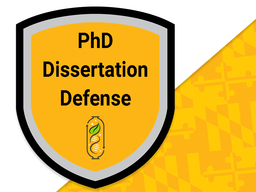PhD Dissertation Defense: Jayashree Yalamanchili
Location
Technology Research Center (TRC) : 206
PhD Dissertation Defense: Jayashree Yalamanchili – Online Event
Date & Time
April 20, 2023, 2:00 pm – 3:00 pm
Description
Jayashree Yalamanchili, PhD Candidate
Advisors: Dr. Christopher Hennigan and Dr. Brian Reed.
Title:
Effects of transition metals in particulate matter on oxidative potential measurements using phosphate-based acellular assays
Abstract:
Particulate matter (PM) is deleterious to human health. Transition metals are hypothesized to be toxic based on their oxidative potential (OP) to generate reactive oxygen species (ROS). Acellular assays use phosphate buffer to simulate human body conditions (pH 7.4, T 37 °C). However, the aqueous metals may undergo physical and chemical transformations in the assay matrix. The metal transformations during the assay could possibly be the reason for differences between chemical assays and epidemiological and toxicological studies of metal toxicity. Although metal complexation and precipitation with phosphate has been extensively studied in other systems interactions of metals with the phosphate buffer in acellular OP chemical assays have not been characterized. Further, there is no data regarding the effect of the metal-phosphate buffer interaction on the OP response. Phosphate buffer concentration is an important parameter that can affect the metal-phosphate buffer interaction for metal precipitates that form complexes with phosphate.
In this work, we first predicted the fate of transition metals in the dithiothreitol (DTT) assay matrix (phosphate buffer) using an equilibrium model and macroscopic experiments where aqueous metals were present at higher concentrations (> 50 μM). We identified metal-phosphate buffer interactions, such as metal precipitation and oxidation, which were dependent on phosphate buffer concentration. Thermodynamically, Fe(III), Fe(II), and Mn(II) mostly precipitate since the aqueous metal concentrations in PM and metal salt experiments exceed their solubilities, and Fe(II) oxidized to Fe(III) during the assay. At low metal concentration, the precipitation of aqueous metals was characterized for individual metals and a NIST reference standard (Urban PM, SRM-1648a). Multiple analyses, such as colorimetry and laser particle light scattering, quantified the metal precipitation. Additionally, microscopic analyses such as Scanning Electron Microscopy (SEM) and Transmission Electron Microscopy (TEM) confirmed the occurrence of precipitation and possible coprecipitation and/ or adsorption in the complex multi-component PM compared to individual aqueous metal salts. The effect of metal precipitation in ambient Baltimore PM and Urban PM (SRM-1648a) during the DTT assay were estimated for varying buffer concentrations (0.01 - 0.50 M). Sample concentration, composition, precipitate size, ionic strength, and phosphate concentration affected the OP measured by the phosphate based DTT assay. Our work provides clear evidence that OP assays need to be standardized in their procedure and offers guidance for how the identified artifact may be minimized.
In light of the fact that other chemical and biological methods also use phosphate buffer to simulate human body conditions, this phenomenon may also extend to other assays such as Ascorbic Acid (AA) assay, and Glutathione (GSH) assay. The interactions of metal cations with the buffer matrix can be extended to other surrogate biological fluids that contain phosphates, such as simulated lung fluid, simulated body fluid, simulated saliva, simulated sweat, and simulated synovial fluid. The findings from this work will have broader implications for quantifying the toxicity and health effects of metals in PM.
Agneda
WEBEX Information:
